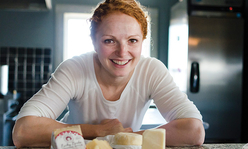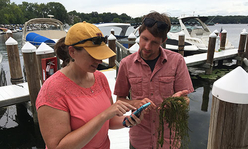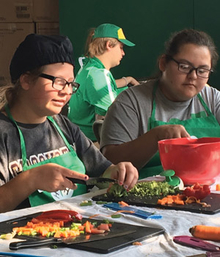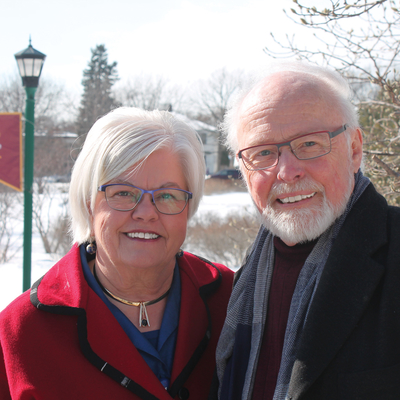Underserved youth flourish in 4-H
Thirty-five percent of Minnesota’s 1 million young people lack the meaningful out-of-school activities that are essential to their success.
Sitting on the living room floor, building a block tower with her 2-year-old brother, 16-year-old Alondra is grateful for the life she’s living in Kasson, Minn. Just a year ago, as a new immigrant from Mexico, Alondra spent most of her after-school time watching her younger siblings. Although she was making friends in school, she still felt lonely and wished for more. Alondra and many like her risk becoming isolated, but Extension can help them find their way.
Alondra’s mom and a University of Minnesota Extension educator named Gabby encouraged her to join the DC Pumas, a Spanish-speaking 4-H club in Dodge County. She was hesitant and shy at first. Over time, through learning experiences with other youth and caring adults, Alondra has blossomed. She discovered her ability to mentor others and make wise choices.
“I am more confident in myself because of 4-H. I talk and share my ideas with people my age and adults too. Now when I work on projects, I trust my judgment and do the best I can.”
Making healthy choices and discovering her influence
Precious (left) of Mahnomen, Minn., is learning to lead in a way that matters to her—sharing kindness, respect, wisdom and a new knowledge of healthy cooking gained through 4-H.
Surrounded by the sweet and earthy aroma of vegetables in her community garden, Precious’ self-worth and vision for the future are cultivated by adults who care about her. Precious is an 11-year-old from Mahnomen, Minn. She is part of 4-H in partnership with the White Earth Tribal Community College. Her club meets twice a month to learn about gardening and cooking. They focus on both traditional Ojibwe foods and modern trends like kale chips.
“The first time I saw kale chips I thought they looked nasty,” says Precious. “But my mentor, Becca, showed us how to make them. They don’t actually taste that bad. It’s cool that we can grow and cook food that’s healthy and good.”
Becca Dallinger’s steady mentorship as a 4-H club leader is helping Precious discover she can be both courageous and a problem-solver.
“She is patient, kind and articulate,” says Becca. “Precious and a fellow 4-H’er recently gave a cooking presentation to board members of the Regional Sustainable Development Partnerships. Precious actually taught all those adults. She’s just starting to see her influence.”
Jessica Pierson Russo, Extension educator, is a leader in expanding access to out-of-school enrichment programs for youth from underrepresented communities. “These programs provide the flexibility in structure necessary to adapt to the changing needs of young people,” she says. “In 4-H, youth gain important skills like leadership and perseverance. Creating a safe and loving environment where all youth have the freedom to explore is critical.”
A vision to be leaders
Both Precious and Alondra visited the Minnesota State Fair to share their 4-H learning with judges and the public. They also spent time with Minnesota 4-H State Ambassadors, who encouraged them to keep growing and finding ways to be leaders.
“They told me I could apply to be a State Ambassador too,” says Alondra. “I could meet kids from all over Minnesota and share my ideas with people who are different from me. I really want to get more involved.”
“A leader is a person who is in front, who stands out and does the right thing,” says Precious. “They show kindness, respect and wisdom.” She paused, an expression of surprised realization on her face. “I guess I am a leader.”
“I could meet kids from all over Minnesota and share my ideas with people who are different from me.” — Alondra
On pace to grow opportunities
David and Valerie Halverson Pace strongly value cross-cultural understanding. David’s 4-H career focused on teen leadership and international exchange programs, helping youth to see themselves in the context of the world around them. He was inducted into the National 4-H Hall of Fame in 2006.
Valerie’s career at IBM made thinking and acting globally a daily experience. She was a 4-H’er and is a lifelong Girl Scout.
The Paces recognize the critical need for all Minnesota youth to build multicultural and inclusive relationships. They have created an estate plan that includes significant funding to develop and expand innovative 4-H learning opportunities for youth and adults to realize the benefits of diversity of thought and experience.
You can learn about including Extension programs in your will and estate planning by contacting Extension’s development office at 612-624-7971.
Training workers across youth-serving organizations
Extension equips caring adults to meet the needs of all Minnesota youth. Last year, Extension educators and specialists trained 792 volunteer and professional youth workers from organizations like Girl Scouts of River Valleys and Big Brothers Big Sisters of the Greater Twin Cities.
“I find myself re-energized after each Extension training session with incredible new resources to use in mentoring youth,” says Jeanna Vazquez, a coordinator with Big Brothers Big Sisters of the Greater Twin Cities who participated in Extension’s Social Emotional Learning series. “The series engaged our staff in reflective opportunities as we mapped out our programs. Social and emotional learning for youth is an individual journey that is closely linked to culture.”
Related stories

4-H alumni
Like thousands of young people before them, these four built skills to lead for life.

Volunteers changes lives
Every day, in every county, Extension volunteers put their passions to work.




